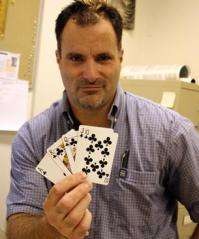D.J. Williams
(PhysOrg.com) -- Parolees with a gambling habit may resort to criminal activities and substance abuse when they are released from prison if there are few community supports to help them re-integrate, a new University of Alberta study has found.
Research conducted by leisure researchers D.J. Williams and Gordon Walker, in the Faculty of Physical Education and Recreation, examined the perceptions of 15 correctional officers in the states of Nevada, a gambling state, and Utah, where gambling is illegal, on offender gambling and its impacts on offender re-entry into the community.
Williams, the paper's lead author, completed his doctorate in physical education and recreation prior to a post-doctoral fellowship focused on gambling issues. His research was funded by the Alberta Gaming Research Institute. He and Walker found there are insufficient practical resources to help problem gambler offenders integrate successfully into the community.
"The treatment options that were available seemed to be out of the price range and not affordable for offenders," said Williams, who adds that, oftentimes, it was presumed other forms of treatment for things like alcohol and substance abuse would address gambling, but that's not necessarily the case.
Gambling is prevalent in prisons and the research found that some inmates who weren't problem gamblers before incarceration became addicted during their jail term. This is worrisome as researchers found that gambling often complicates offenders' efforts to live crime-free.
"If we can address gambling we should be able to reduce future crime," said Williams. "It seems as though this is an area where there are complications that really haven't been picked up on yet and that we need to take a look at."
Williams and Walker are the first researchers to look at gambling after prison, although a number of studies look at offender gambling before incarceration and while in prison. Williams says the issue of gambling addiction post-release needs much more attention from corrections professionals.
"Correctional administrators really need to look at the gambling that's happening inside prisons and jails and what needs to happen in terms of offenders transitioning out when they have those problems," said Williams. "I think parole officers and correctional supervisors need to be aware that this is a real issue that can have potentially big consequences when offenders re-enter the community."
Provided by University of Alberta (news : web)


















